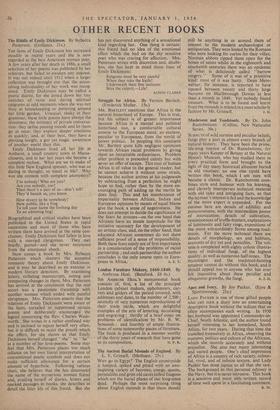THE fame of Emily Dickinson has increased steadily in recent
years and she is now regarded as the best American woman poet. A few years after her death in 1886, a small selection of her poems was published by her relatives, but failed to awaken any interest. It was not indeed until 1912 when a larger collection was brought out that the aston- ishing individuality of her work was recog- nised. Emily Dickinson may be called a poetic diarist, for she jotted down her tiny snatches of verse and daring spiritual epigrams at odd moments when she was not busy at housekeeping or pottering around her little garden. Unequal, shaky in their grammar, these little poems have always the directness, the intimacy of private conversa- tion: they define passing moods and let them go at once; they explore deeper emotions as quickly; and, at their best, they have a piercing insight, a gay yet tragic awareness of another world than this.
Emily Dickinson lived all her life at Amherst, a small country town in Massa- chusetts, and in her last years she became a complete recluse. What are we to make of this little New England spinster, who was so daring in thought, so timid in life? Why was she content with complete anonymity?
I'm nobody! Who are you? Are you nobody, too? Then there's a pair of us—don't tell! They'd banish us, you know.
How dreary to be somebody! How public, like a frog To tell your name the livelong day To an admiring bog!
. Biographical and critical studies have been published in the United States in rapid succession and most of those who have written them have arrived at the same con- clusion. Emily Dickinson had fallen in love with a married clergyman. They met briefly, parted—and she never recovered from the emotional shock. has not discovered anything of a sensational kind regarding her. One thing is certain: this friend had no idea of the emotional effect which she had on the shy sensitive poet who was craving for affection. Mrs. Patterson writes with discretion and, doubt- less, she has kept in mind those lines of Emily Dickinson:
Surgeons must be very careful When they take the knife!
Underneath their fine incisions Stirs the culprit,—Life!
AUSTIN CLARKE










































 Previous page
Previous page